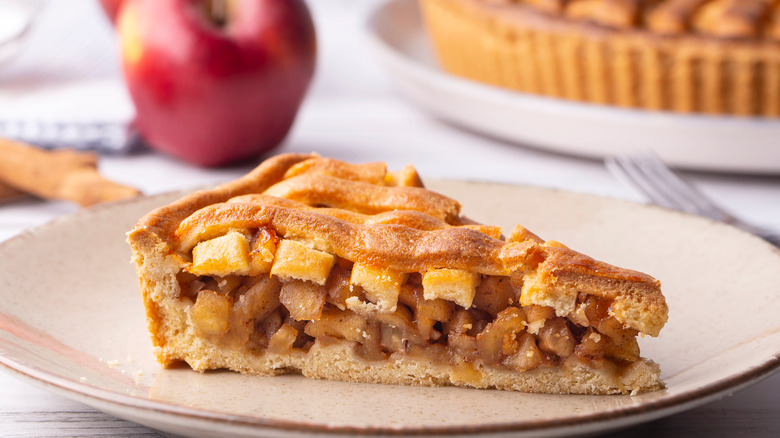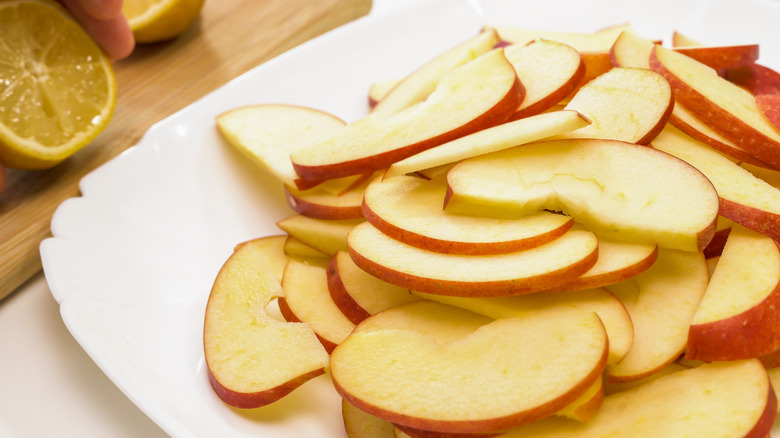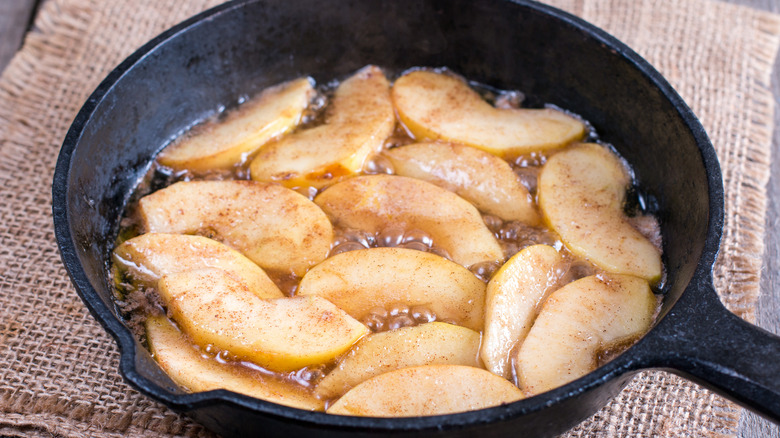The Reason You Should Be Salting Apples Before Baking
When you ask home cooks and pro bakers alike how they make apple pie, chances are you're going to get as many different answers as people you asked. That's because there are tons of variances in how people make apple pie, from whether they use homemade or store-bought crust to whether they prefer their apples diced or cubed. But there's one unconventional step that could help improve almost any kind of apple pie: salting your apples. But this trick isn't just for pie; you can use the technique to reduce the moisture and improve the flavor of apples you use in crisps, turnovers, cakes, and more.
There are actually quite a few reasons why salting apples before baking can improve your baked apple goods. For one thing, salt draws the moisture out of apples. After letting your salted apples sit, you can discard this liquid, and your fruit won't release so much water while cooking, which will help you avoid watery, soggy baked goods. But that's not all. Salt also helps tenderize apple slices (which is useful depending on the age and variety of apples being used), prevents sliced or diced apples from browning, and improves the flavor of apples by taming any bitterness and enhancing their sweetness.
To get all those benefits, you just need to incorporate a very simple step into your apple recipes; you even have a couple of salting methods to choose from.
How to salt apples for baking
Just as with brining meat, there are two different ways you can salt apples before baking: dry or wet. To do a sort of quick dry brine on apples, slice them and lay them in a single layer on paper towels, sprinkling a pinch of salt over top and letting the apples sit for about 5 minutes. Blot the apple slices with a paper towel to remove any excess moisture that's seeped out (as you might with eggplant). Taste an apple slice; if it's unpalatably salty, you can rinse the apples and dry them with a paper towel before proceeding. From there you can continue with your apple recipe as usual.
Another way to salt apples before baking is to soak the sliced or diced apples in salt water. This both prevents oxidation, when the apples turn brown after being cut, and draws out extra moisture from the apples like when you soak potatoes in salt water before making french fries. The apples can be rinsed if they're too salty, but a little salt flavor will help balance the sweetness in the rest of whatever baked good you're cooking, making the flavor more vibrant.
Other ways to avoid a soggy apples when baking
Salting your apples before baking them is just one way to prevent a soggy apple pie or watery pie filling. Other methods people use include adding flour, cornstarch, or minute tapioca to the mix of apples, sugar, and spices, but the most common technique is simply pre-cooking your apples, which you can do after salting them to maximize the potential of your dessert.
Some might be concerned that cooking your apples ahead of time could result in soggy or mushy apples, but it actually has the opposite effect. Gently cooking apples changes their molecular structure, converting the pectin into a heat-stable form that resists breaking down when heated further, meaning your stove-top apple filling with al dente apples will stay that way. You can cook them along with your other filling ingredients on the stovetop at a simmer. If your apples reach your preferred tenderness and there's still too much liquid in the pan, strain out the apples and continue to reduce the juices until thickened, then recombine and bake.
Salting your apples alone will help reduce your chances of baking a soggy, watery mess, but salting and pre-cooking them gives you an even better chance of producing an apple dessert that stands out from the rest.


